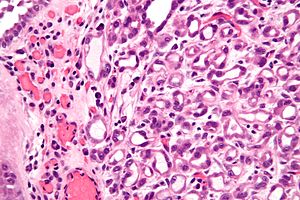Nephrogenic adenoma
Jump to navigation
Jump to search
| Nephrogenic adenoma | |
|---|---|
| Diagnosis in short | |
 Nephrogenic adenoma. H&E stain. | |
|
| |
| Synonyms | mesonephric adenoma, nephrogenic metaplasia |
|
| |
| LM | classically tubular structures with a microcystic appearance lined by hobnailed cells +/-thick eosinophilic basement membrane; may have tubulocystic, polypoid, papillary or fibromyxoid architecture; usually associated with chronic inflammation |
| LM DDx | urothelial carcinoma microcystic and nested variants, prostatic adenocarcinoma, clear cell adenocarcinoma (clear cell adenocarcinoma of the urethra, clear cell carcinoma of the urinary bladder, metastatic clear cell adenocarcinoma) |
| IHC | CK7 +ve, PAX8 +ve, p53 -ve, CEA -ve, Ki-67 low (<5%) |
| Site | urothelium - usu. urinary bladder |
|
| |
| Prevalence | uncommon |
| Endoscopy | occasionally a papillary-like mass or flat velvety lesion |
| Prognosis | benign |
| Clin. DDx | no treatment necessary (?) |
Nephrogenic adenoma, also known as mesonephric adenoma,[1] and nephrogenic metaplasia, is a rare lesion that is classically in the urinary bladder and can mimic adenocarcinoma.
It should not be confused with metanephric adenoma.
General
Features:[2]
- Benign.
- May mimic adenocarcinoma!
- Classic location is the urinary bladder.
- Also reported in ureter and prostatic urethra.
- It is thought to result from displacement of renal tubular cells, as this entity in renal transplant recipients is graft derived.[3]
Gross
Features:
- Usually an incidental finding only seen on microscopy.
- May manifest as:
Microscopic
Features:[2]
- Tubular structures - the classic morphology. †
- Lined by a single cell layer - classically hobnailed. ‡
- +/-Thick eosinophilic basement membrane.
- Typically microcystic appearance.
- Usually associated with chronic inflammation.
Notes:
- May mimic vascular/lymphatic channels - can be sorted-out with IHC.
- † May be tubulocystic, polypoid, papillary or fibromyxoid.[5]
- ‡ May be flat.[5]
- Should not have necrosis or mitoses.
DDx:
- Urothelial carcinoma, microcystic and nested variants.
- Clear cell adenocarcinoma.
- Clear cell adenocarcinoma of the urethra.
- Mesonephroid adenocarcinoma[6] (also known as clear cell carcinoma[7]) - may be deceptively bland.
- Prostatic adenocarcinoma.
- Metastatic tumours.
Images
www:
IHC
Features:[9]
Others:[2]
- p53 -ve.
- CEA -ve.
- Ki-67 low (<5%).
- MUC1 +ve.
- Marks distal renal tubule.[11]
- PSA -ve.[12]
- PSAP -ve.[12]
- CD34 -ve.[13] (???)
- p63 -ve (0/32 cases[14] ).
- CK20 -ve usually (6 +ve of 32 cases[14]).
- CK34betaE12 -ve usually (8+ve of 32 cases[14]).
Sign out
PROSTATE TISSUE, TRANSURETHRAL RESECTION OF THE PROSTATE (TURP): - BENIGN PROSTATE TISSUE WITH GLANDULAR AND STROMAL PROLIFERATION. - UROTHELIAL MUCOSA WITH A MILD LYMPHOCYTIC INFILTRATE AND CHANGES CONSISTENT WITH CYSTITIS CYSTICA. - BENIGN CALCIFICATIONS. - NEPHROGENIC METAPLASIA (MESONEPHRIC ADENOMA), SEE COMMENT. - NEGATIVE FOR MALIGNANCY. COMMENT: Nephrogenic metaplasia is a benign finding. It is confirmed with immunostaining (POSITIVE for CK7, PAX8; NEGATIVE for AMACR, CK34betaE12 (very focal staining)).
See also
References
- ↑ Singh, KJ. (Jan 2011). "Mesonephric adenoma in remnant ureteric stump: A rare entity.". Indian J Urol 27 (1): 140-1. doi:10.4103/0970-1591.78414. PMID 21716880.
- ↑ 2.0 2.1 2.2 Gokaslan, ST.; Krueger, JE.; Albores-Saavedra, J. (Jul 2002). "Symptomatic nephrogenic metaplasia of ureter: a morphologic and immunohistochemical study of four cases.". Mod Pathol 15 (7): 765-70. doi:10.1097/01.MP.0000019578.51568.24. PMID 12118115. http://www.nature.com/modpathol/journal/v15/n7/full/3880603a.html.
- ↑ Mazal, PR.; Schaufler, R.; Altenhuber-Müller, R.; Haitel, A.; Watschinger, B.; Kratzik, C.; Krupitza, G.; Regele, H. et al. (Aug 2002). "Derivation of nephrogenic adenomas from renal tubular cells in kidney-transplant recipients.". N Engl J Med 347 (9): 653-9. doi:10.1056/NEJMoa013413. PMID 12200552.
- ↑ 4.0 4.1 Amin, Mahul B. (2010). Diagnostic Pathology: Genitourinary (1st ed.). Amirsys. pp. 2-27. ISBN 978-1931884280.
- ↑ 5.0 5.1 Piña-Oviedo, S.; Shen, SS.; Truong, LD.; Ayala, AG.; Ro, JY. (Jun 2013). "Flat pattern of nephrogenic adenoma: previously unrecognized pattern unveiled using PAX2 and PAX8 immunohistochemistry.". Mod Pathol 26 (6): 792-8. doi:10.1038/modpathol.2012.239. PMID 23328975.
- ↑ Doddamani, D.; Ansari, MS.; Gupta, NP.; Aron, M.; Singh, I.; Datta Gupta, S. (2002). "Mesonephroid adenocarcinoma of the bladder and urethra: a case report.". Int Urogynecol J Pelvic Floor Dysfunct 13 (1): 47-9. PMID 11999207.
- ↑ Abbas, M.; Kramer, MW.; Wolters, M.; Herrman, TR.; Becker, JU.; Kreipe, HH. (Feb 2013). "Adenocarcinoma of the urinary bladder, mesonephroid type: a rare case.". Rare Tumors 5 (1): e3. doi:10.4081/rt.2013.e3. PMID 23772302.
- ↑ Kunju, LP. (Oct 2010). "Nephrogenic adenoma: report of a case and review of morphologic mimics.". Arch Pathol Lab Med 134 (10): 1455-9. doi:10.1043/2010-0226-CR.1. PMID 20923300.
- ↑ Alexiev, BA.; Levea, CM. (Mar 2012). "Nephrogenic Adenoma of the Urinary Tract: A Review.". Int J Surg Pathol. doi:10.1177/1066896912439095. PMID 22415059.
- ↑ Tong, GX.; Melamed, J.; Mansukhani, M.; Memeo, L.; Hernandez, O.; Deng, FM.; Chiriboga, L.; Waisman, J. (Mar 2006). "PAX2: a reliable marker for nephrogenic adenoma.". Mod Pathol 19 (3): 356-63. doi:10.1038/modpathol.3800535. PMID 16400326.
- ↑ Fromont, G.; Barcat, L.; Gaudin, J.; Irani, J. (Nov 2009). "Revisiting the immunophenotype of nephrogenic adenoma.". Am J Surg Pathol 33 (11): 1654-8. doi:10.1097/PAS.0b013e3181b40061. PMID 19730362.
- ↑ 12.0 12.1 Malpica, A.; Ro, JY.; Troncoso, P.; Ordoñez, NG.; Amin, MB.; Ayala, AG. (Apr 1994). "Nephrogenic adenoma of the prostatic urethra involving the prostate gland: a clinicopathologic and immunohistochemical study of eight cases.". Hum Pathol 25 (4): 390-5. PMID 7512941.
- ↑ Aldenborg, F.; Peeker, R.; Fall, M.; Olofsson, A.; Enerbäck, L. (Jul 1998). "Metaplastic transformation of urinary bladder epithelium: effect on mast cell recruitment, distribution, and phenotype expression.". Am J Pathol 153 (1): 149-57. doi:10.1016/S0002-9440(10)65555-1. PMID 9665475.
- ↑ 14.0 14.1 14.2 Shen, Q.; Sun, LH.; Wang, JH.; Liu, LB.; He, Q.; Jin, J. (Aug 2013). "[Pathological and immunohistochemical analyses of 32 cases of nephrogenic adenoma].". Beijing Da Xue Xue Bao 45 (4): 522-6. PMID 23939154.


